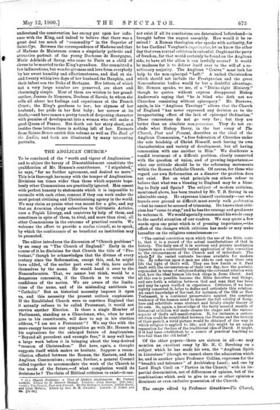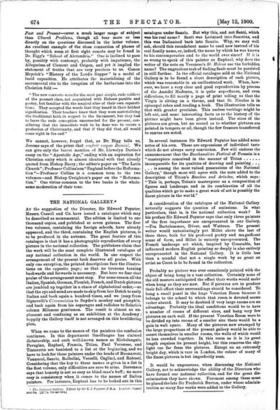THE ANGLICAN CHURCH.*
To be convinced of the " worth and vigour of Anglicanism" and to abjure the heresy of Disestablishment constitute the qualification of Mr. Henson's contributors. " I stipulated," he says, " for no further agreement, and desired no more." This is in thorough harmony with the temper of Anglicanism. Divisions ten times wider than those which separate hope- lessly other Communions are practically ignored. Men assent with perfect honesty to statements which it is impossible to reconcile with each other, content if they can work under the most potent civilising and Christianising agency in the world. We may claim as praise what was meant for a gibe, and say that an Arminian clergy subscribes to Calvinistic Articles, uses a Popish Liturgy, and contrives by help of them, and sometimes in spite of them, to rival, and more than rival, all other Communions in the outcome of practical results. We welcome the effort to provide a modus vivendi, so to speak, by which the continuance of so beneficial an institution may be promoted.
The editor introduces the discussion of "Church problems" by an essay on " The Church of England." Early in the course of it he disclaims for that Church the title of "Pro- testant," though he acknowledges that the divines of every century since the Reformation, except this, and, he might have added, 'of the earlier part even of this, have called themselves by the name. He would hand it over to the Nonconformists. That, we cannot but think, would be a dangerous concession, if the Church is to retain the confidence of the nation. We are aware of the limita- tions of the name, and of its misleading antithesis to " Catholic." But an historical necessity imposes it upon us, and this necessity the present outlook emphasises. If the Established Church were to convince England that it actually refuses to be called Protestant, it would not survive another Election. Is there a single Member of Parliament, standing as a Churchman, who, when he next goes to his constituents, will dare to say in his election address, "I am not a Protestant " ? We say this with the more energy because our sympathies go with Mr. Henson in his aspirations for the enlarged future of Anglicanism. " Beyond all precedent and example free," it may well have a large work before it in bringing about the long-desired "reunion of Christendom." But here, again, a thought suggests itself which makes us hesitate. Suppose a recon- ciliation effected between the Roman, the Eastern, and the Anglican Communions ; suppose, farther, a general Council called together to accommodate the work of the Church to the needs of the future,—of what complexion would its decisions be ? The claim of Biblical criticism to exist—it can- _
• (1.) Church Problems= a Vivo of Modern Anglicanism. By cartons Authors. Edited by IL Hensley Henson. London : John Murray. [12s. net.] —(2.) The Church, Past and Present. By the Bishop of London, Bishop Barry, and other Writers. Edited by Rev. Li. M. Gwatkiu. London : J. Nisbet and Oa [7s. 6d.]
not exist if all its conclusions are determined beforehand—is brought before the august assembly. How would it be re- ceived ? A Roman theologian who speaks with authority, for
he has Cardinal Vanghan's imprimatur,let us know the other day that even textual criticism is unlawful. Ought not the party
of freedom, for that would certainly be found on the Anglican side, to have all the allies it can lawfully secure ? It would be madness for it to deliver itself over to the will of a re- actionary majority. The Anglican " Centre " must look for help to the non-episcopal "Left." A united Christendom which should not include the Presbyterian and the great Nonconformist bodies would be but a doubtful advantage. Mr. Henson speaks, we see, of a "Divine-right Ministry," though he quotes without express disapproval Bishop Andrewes's saying that "he is blind who doth not see Churches consisting without episcopacy." Mr. Burrows, again, in his "Anglican Theology" allows that the Church of England "has never expressed any decision as to the incapacitating effect of the lack of episcopal Ordination."
These concessions do not go very far ; but they are
better than an absolute non-possuinus. They do not ex- clude what Bishop Barry, in the last essay of The Church, Past and Present, describes as the ideal of the Anglican Communion, "a free federation of Churches under the sole headship of Christ Himself, each having its own
characteristics and variety of development, but all having communion with one another in Him." We desiderate candid treatment of a difficult problem, closely connected with the question of union, and of growing importance,—
what our attitude should be to the reforming movements within the Roman Catholic Church. Of course, for those who
regard our own Reformation as a disaster the problem does not exist. But on what principle can others refuse to believe that what was a blessing to England may be a bless- ing to Italy and Spain P The subject of modern criticism, mentioned above, has been treated by Mr. T. B. Strong in an admirable essay. He expresses himself cautiously—one who
travels over ground so difficult mast surely walk pedetentin —bat he cannot be accused of trimming. He knows that criti- cism has "come to stay," and he has the courage and good sense
to welcome it. We would specially recommend his whole essay to the careful attention of our readers. We may quote a few words upon one point which is of pressing importance,—the effect of the changes which criticism has made or may make hereafter on the religions consciousness :—
" The central conviction upon which the use of the Bible rests is, that it is a record of the actual manifestations of God in history. The daily use of it in services and private meditation depends upon a continually varied application of this conviction to the circumstances of the Church and of individuals. The whole .•of its varied contents becomes available for modern life. lay reflection upon it men are able to cast upon their own life the light of God's will. They see how Isaiah or S. Paul dealt with the circumstances of their own day, how the psalmist expounded in terms of religious feeling the covenant relation with God, how the ideal human life took shape in Jesus Christ. And all this use is possible because the Bible describes real things, and sets forth a relation between God and man that has been and may be again verified in experience. Criticism, if we have rightly conceived it, helps to define and articulate this relation. An exact knowledge of the text, for instance, of the Old or New Testament, is a continual preservative against the constant tendency of the human mind to desert the full solidity of Scrip- ture and substitute some abstract and fatally simple theory of its own. So, again, a knowledge of the fairly assured results of historical criticism will make clearer the stages and the various aspects of God's self-manifestation. If, for instance, a certain relation could be established between the Psalms and the history of their peril 7, a vivid picture would be obtained of the way in which religion is applied to life ; and this might be an ample reparation for the loss of the traditional idea of David. It might, if it had been established, be a source of practical teaching no less full than the old belief."
Of the other papers—there are sixteen in all—we may mention an excellent essay by Mr. H. C. Beeching on a subject which he has made his own, the "Anglican Spirit in Literature" (though we cannot share the admiration which he, and in another place Professor Collins, expresses for the " breadth and tolerance " of Archbishop Land); and one by Lord Hugh Cecil on " Parties in the Church," with its im- partial denunciation, not of differences of opinion, but of the combinations which seek to give to one or other opinion a dominant or even exclusive possession of the Church.
The essays edited by Professor Gwatkin—The Church, Past and Present—cover a much larger range of subject than Church Problems, though all bear more or less directly on the questions discussed in the latter volume. An excellent example of the close connection of phases of thought which seem at first sight remote may be found in Dr. Bigg's "School of Alexandria." One is inclined to pass by, possibly with contempt, probably with impatience, the Allegorism of Clement and Origen, and yet it implied the statement of truths that are very precious to us. Canon Meyrick's "History of the Lord's Supper" is a model of lucid exposition. He attributes the materialising of the sacramental rite to the irruption of the barbarians into the Christian fold :- " The new converts were for the most part simple, rude soldiers of the peasant class, not acquainted with Hebrew parable and poetry, but familiar with the magical rites of their own supersti- tions. They accepted the words that they heard in their baldest signification. Their teachers knew that they were materialising the traditional faith in respect to the Sacrament, but they had to leave the rude conception uncorrected for the present, con- sidering that the immediate work to be done was to secure a profession of Christianity, and that if they did that, all would come right in the end."
We cannot, however, forget that, as Dr. Bigg tells us, Jerome says of the priest that confleit corpus Domini. We can give only the barest mention of Mr. Llewelyn Davies's essay on the "Apostolic Age," ending with an aspiration for Christian unity which is almost identical with that already quoted from Bishop Barry ; the editor's paper on " The Latin Church"; Professor Collins's on "England before the Reforma- tion "—Professor Collins is a common term to the two volumes—and Bishop Creighton's paper on the " Reforma- tion." One virtue common to the two books is the whole- some moderation of their tone.







































 Previous page
Previous page